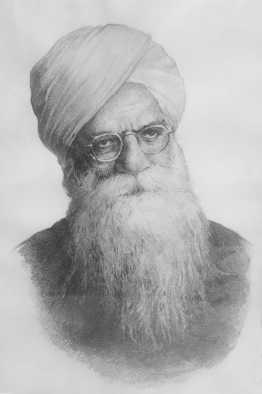
Remembering Bhai Vir Singh on his 61st death anniversary
Mohinder Singh
To mark the completion of year-long celebration of the tercentenary of birth of the Khalsa in 1999, a survey was conducted as to “who was the most influential Sikh of the 20th century?” Bhisham Sahni, Ajeet Caur, Patwant Singh, Maheep Singh, Manjit Bawaand and others agreed that it was Bhai Vir Singh, who left a lasting impression as a man of letters. He was declared as the ‘Greatest Sikh’ of 20th century.
While there is no denying the fact that Bhai Vir Singh was, and remains, the most influential Sikh scholar of the 20th century, a careful study of his writings shows that his concerns transcended boundaries of time and space. It is, therefore, important that Bhai Vir Singh, the greatest literary figure of his time, is taken out of the ‘temple of adoration’ as ‘poet of Sikhs’ and projected as ‘poet of cosmos’ with concerns beyond Sikh identity.
Vir Singh was born in 1872 in Amritsar in a family known for traditional scholarship. His father, Dr Charan Singh was a well-known scholar of Braj, Sanskrit and Punjabi. Apart from translating the well-known play Shakuntlam into Punjabi, he also wrote a number of tracts on Gurbani and didactic prose. His maternal grandfather Giani Hazara Singh was a man of letters and is famous for his seminal work — Guru Granth Kosh and exposition of Varan Bhai Gurdas. With such a family background, it was not surprising that young Vir Singh decided to devote his life to rejuvenate Sikh heritage and promote Punjabi language and literature. For this purpose, he wrote numerous novels, poems, religious histories, biographies of the Gurus and exegesis, epic, pamphlets, newspaper articles and tracts.
Bhai Vir Singh was born at a time when Punjab was going through identity crisis as a result of fall of the kingdom of Punjab. The annexation of Punjab by the British rulers posed a serious threat to the Sikh identity as reported in a contemporary newspaper, the Khalsa Akhbaar: “An English newspaper writes that the Christian faith is making rapid progress and makes the prophecy that, within the next 25 years, one-third of the Majha area would be Christian. The Malwa will follow suit. Just as we do not see any Buddhists in the country except in images, in the same fashion Sikhs, who are now, here and there, visible in their turbans and their other religious forms will be seen only in pictures in the museums. Their own sons and grandsons turning Christians and clad in coats and trousers and sporting mushroom-like caps, will go to see them in the museums and say in their pidgin Punjabi, ‘Look, that is the picture of a Sikh — the tribe that inhabited this country once upon a time’.”
To redeem this situation, some well-meaning Sikhs set up the Singh Sabha in 1873 to revive the pristine glory of Sikh religion and to affirm Sikh identity. As time passed, Bhai Vir Singh became a product as well as the leading light of the movement. He was well aware of the modus operandi of the Christian missionaries and realised how the setting up of first printing press in Ludhiana in 1835 had redoubled their missionary efforts. It was, therefore, in the logic of things that in Bhai Vir Singh’s plan of countering missionary propaganda, a printing press was set up in Amritsar in 1892, which became a powerful vehicle of propaganda of the Singh Sabha movement. Two years later, the Khalsa Tract Society was also established in Amritsar with the objective of reaching larger Sikh audience. In 1899, Bhai Vir Singh founded a Punjabi weekly, the Khalsa Samachar.
He is recognized as the father-figure amongst Punjabi writers who turned to writing in Punjabi at a time when it was not considered a literary language. His novels are a perfect example of his literary abilities and reform instincts. In fact Sundri, first published in 1898, continues to be a best seller even today and has been re-printed over times, latest being the 49th edition. He was the first to write in Punjabi in genres such as drama and epic.
The cumulative effect of Bhai Vir Singh’s writings, opening of network of Khalsa schools and colleges and the launch of Punjab and Sind Bank was that the Sikh community regained their lost glory after the fall of the Sikh kingdom. While Bhai Vir Singh preferred to live in anonymity, honours came unsought: he was conferred Honorary Doctorate in Oriental Learning in 1949; nominated to the Punjab Legislative Council in 1952; presented the Sahitya Akademi Award in 1953 for his book Mere Saiyan Jeo and Padam Bhushan in 1956.
After a brief illness, Bhai Vir Singh passed away on June 10, 1957, at his house in Lawrence Road, Amritsar, which has since been converted into Bhai Vir Singh Museum and Library. A central memorial, the Bhai Vir Sigh Sahitya Sadan was set up in New Delhi in 1958 which has been promoting objectives of Bhai Vir Singh’s writings.
The writer is Director, National Institute of Panjab Studies, Bhai Vir Singh Sahitya Sadan, New Delhi



























